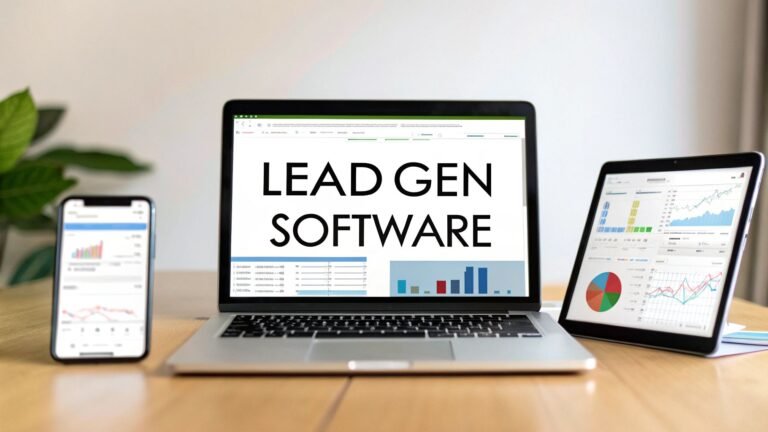In today's competitive market, a steady stream of qualified leads isn't a luxury; it's the lifeblood of your business. Manually prospecting and nurturing contacts is inefficient and doesn't scale. The right technology can transform your entire process, from identifying anonymous website visitors to automating outreach and scoring potential customers. This guide cuts through the noise to analyze the 12 best lead generation software platforms available today.
We'll break down each tool's core strengths, practical use cases, and honest limitations to help you choose the perfect solution. Whether you need to enrich contact data, create high-converting landing pages, or uncover who is visiting your website, this list has a specialized tool for the job. To streamline your entire sales process and maximize efficiency, consider exploring comprehensive sales automation solutions that can integrate with many of these platforms.
This resource is designed for action. Each entry provides a clear overview, pros and cons, and pricing information to help you make a quick, informed decision. We've included screenshots for a firsthand look at the user interface and direct links to get you started faster. Our goal is to help you find the right software to build, manage, and convert your sales pipeline more effectively, moving beyond generic lists to provide real strategic value. Forget the guesswork; let's find the tool that will fuel your sales engine.
1. B2B Email Verifier
B2B Email Verifier establishes itself as a foundational tool for any serious lead generation strategy, focusing on a critical, often-overlooked first step: data quality. While not a lead discovery platform itself, it perfects the data you already have, ensuring your outreach efforts aren't wasted on dead-end contacts. Its core function is to meticulously clean and validate B2B email lists, using sophisticated algorithms to achieve an impressive accuracy rate of over 99%.
This platform is engineered for efficiency, capable of processing thousands of contacts in seconds through its bulk upload feature. By systematically identifying and removing invalid, risky, or non-existent email addresses, B2B Email Verifier directly tackles the primary causes of high bounce rates and spam complaints. This proactive list hygiene is essential for protecting and enhancing your sender reputation, which is a key factor in email deliverability and overall campaign success. It is an indispensable piece of the best lead generation software stack for teams that prioritize ROI.
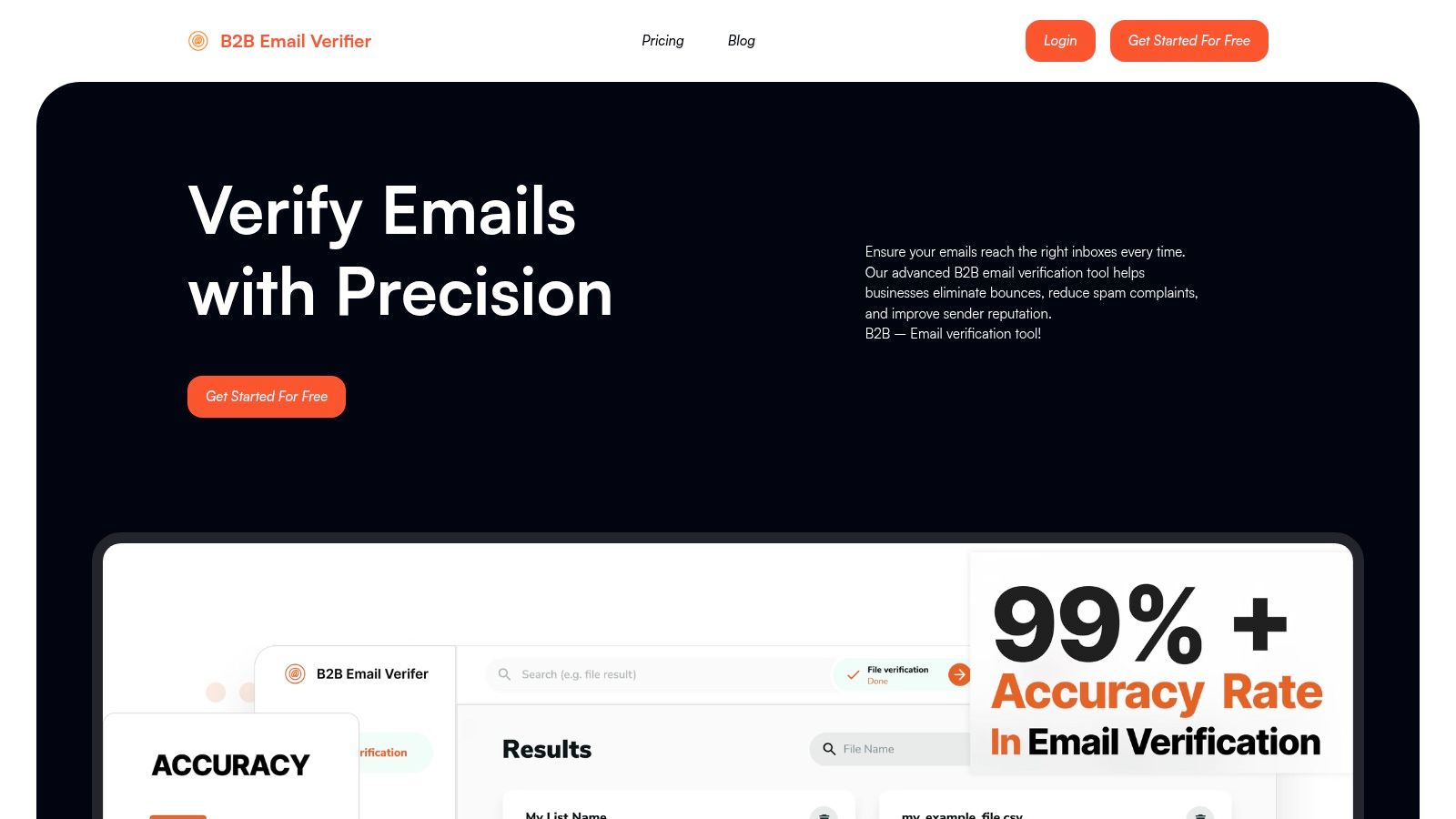
Key Features & Use Cases
- High-Accuracy Verification: The platform's >99% accuracy rate is its standout feature. For sales teams, this means more of their carefully crafted proposals actually reach the intended decision-makers, increasing the chances of closing deals. Marketing agencies can confidently run large-scale campaigns for clients, knowing their deliverability metrics will be strong.
- Bulk Processing Power: Its ability to handle large datasets quickly makes it ideal for data management specialists tasked with cleansing massive contact databases or preparing lists for a major product launch.
- End-to-End Encryption: Security is paramount, and B2B Email Verifier protects your sensitive contact lists during both upload and storage. This makes it a trusted choice for enterprises and SaaS startups that handle proprietary customer data.
- Collaborative Workspaces: Available in higher-tier plans, this feature allows marketing and sales teams to work from a single, verified source of truth. This prevents duplicate outreach and ensures everyone is using the most up-to-date, clean contact information.
| Feature Highlights | Practical Benefit | Ideal User |
|---|---|---|
| >99% Validation Accuracy | Maximizes email deliverability and protects sender score. | Email Marketing Professionals |
| Rapid Bulk Uploads | Saves significant time on list cleaning and preparation. | Data Management Specialists |
| Robust Data Encryption | Ensures compliance and security for sensitive contact lists. | SaaS & Technology Startups |
| Flexible Subscription Tiers | Scales with your business from basic needs to enterprise-level campaigns. | Marketing Agencies |
Pros:
- Delivers exceptional accuracy in email validation, drastically reducing hard bounces.
- Processes thousands of contacts within seconds, boosting operational efficiency.
- Ensures data security with end-to-end encryption.
- Offers flexible subscription tiers with scalable credits and collaborative workspaces.
- Dedicated customer support provides timely assistance with integration and usage.
Cons:
- Pricing for enterprise plans requires contacting sales, as it is not publicly listed.
- Primarily focused on B2B email lists, which may limit its utility for B2C marketers.
Website: https://b2bemailverifier.com
2. HubSpot Marketing Hub
HubSpot Marketing Hub stands out as an all-in-one platform designed to attract and convert leads within a single, integrated ecosystem. Rather than piecing together separate tools, HubSpot combines a powerful CRM with a full suite of marketing automation features. This allows teams to create landing pages, deploy pop-up forms, and launch live chat conversations without managing multiple subscriptions or clunky integrations.
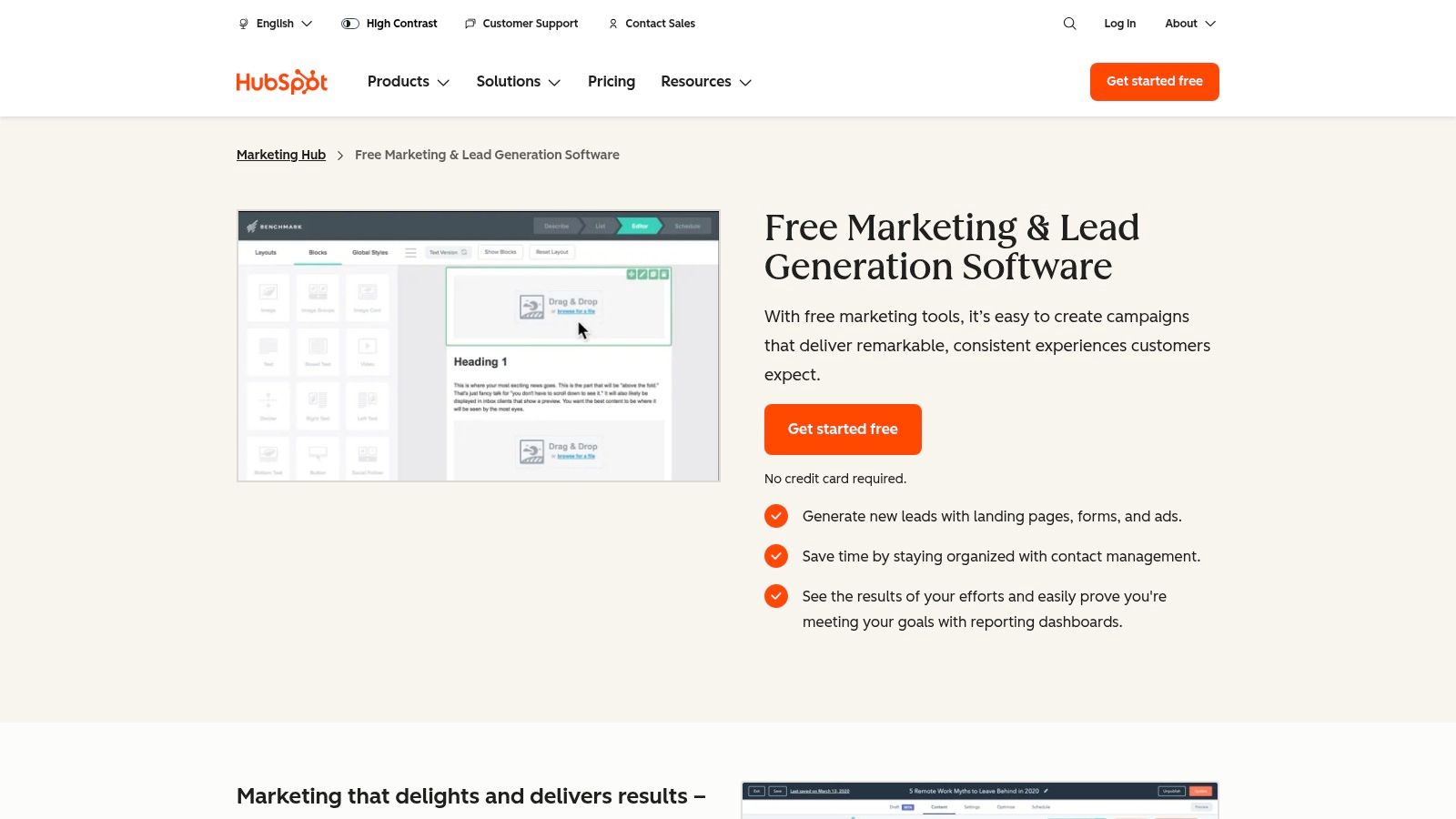
What makes HubSpot one of the best lead generation software options is its seamless data flow. When a lead submits a form, their information is instantly available in the CRM, allowing you to trigger automated email nurturing sequences or score their engagement for sales readiness. For those evaluating their options, this platform simplifies the entire process from capture to close. You can see how it stacks up against other tools in this email marketing platform comparison.
Key Features & Considerations
Best for: Businesses of all sizes seeking a unified platform to manage the entire lead lifecycle, from initial capture to customer conversion and beyond.
-
Pros:
- Unified Platform: Consolidates CRM, email marketing, landing pages, and automation, reducing the need for third-party tools.
- User-Friendly: The interface is clean and intuitive, supported by extensive free training and certifications via HubSpot Academy.
- Scalability: Offers a generous free plan, with clear upgrade paths to advanced features as your business grows.
-
Cons:
- Cost at Scale: Pricing can become a significant investment as your contact list grows and you add more users.
- Onboarding Fees: Higher-tier plans (Professional and Enterprise) require a mandatory, one-time onboarding fee.
Website: HubSpot Marketing Hub
3. Apollo.io
Apollo.io serves as an end-to-end sales engine, combining a massive B2B contact database with a full suite of engagement and intelligence tools. Unlike platforms that only provide data, Apollo allows sales teams to find prospects, enrich records, and launch outbound sequences directly within one interface. This integrated approach streamlines the entire top-of-funnel process, from identifying ideal customer profiles to initiating the first touchpoint.
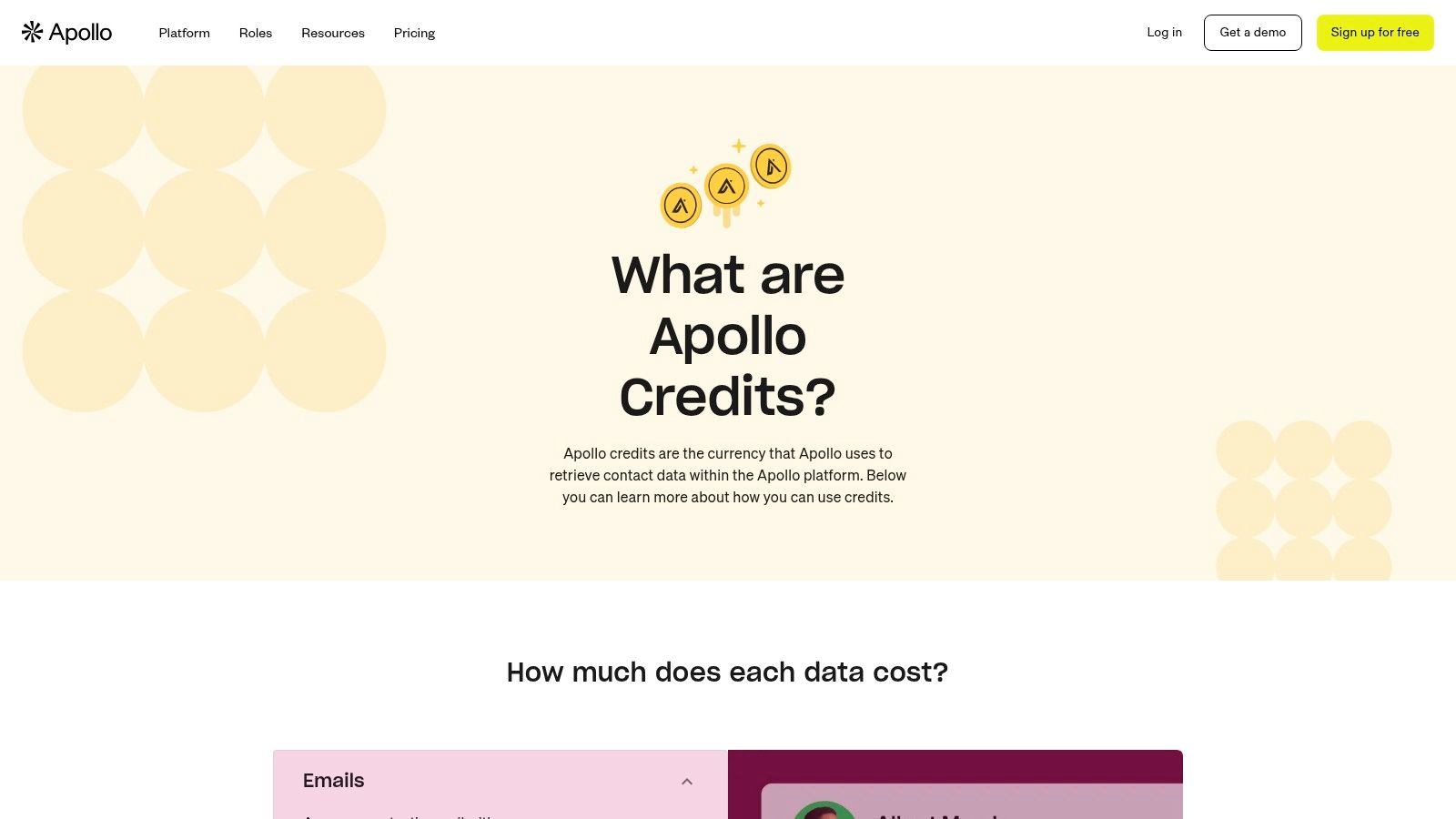
What makes Apollo.io a top choice for the best lead generation software is its powerful combination of data access and sales execution. Teams can build highly targeted lists using dozens of filters and then immediately enroll those contacts into automated email and call sequences. This eliminates the friction of exporting lists to a separate sales engagement tool, allowing for faster and more efficient prospecting cycles. The platform's flexible, credits-based system also makes it accessible for teams of all sizes.
Key Features & Considerations
Best for: Sales and business development teams focused on outbound prospecting who need both a reliable data source and powerful engagement tools in a single platform.
-
Pros:
- Strong Price-to-Value: Offers a generous free plan and competitive pricing, providing a high return on investment for SMBs and mid-market companies.
- Integrated Data & Engagement: Combines a vast contact database with email sequencing, a power dialer, and analytics, removing the need for separate tools.
- Flexible Credit System: The credit-based model for accessing contact data allows for customization and scalability based on team needs.
-
Cons:
- Use-It-or-Lose-It Credits: Monthly credits do not roll over, which may be a drawback for teams with fluctuating prospecting needs.
- Tiered Feature Access: Some advanced features, like intent data and more comprehensive analytics, are locked behind higher-tier plans.
Website: Apollo.io
4. ZoomInfo SalesOS
ZoomInfo SalesOS is an enterprise-level B2B intelligence platform built for high-velocity sales and marketing teams. It moves beyond basic lead capture by providing a massive, searchable database of company and contact information, enriched with real-time intent data. This allows users to identify accounts actively researching their solutions, ensuring prospecting efforts are timely and relevant.
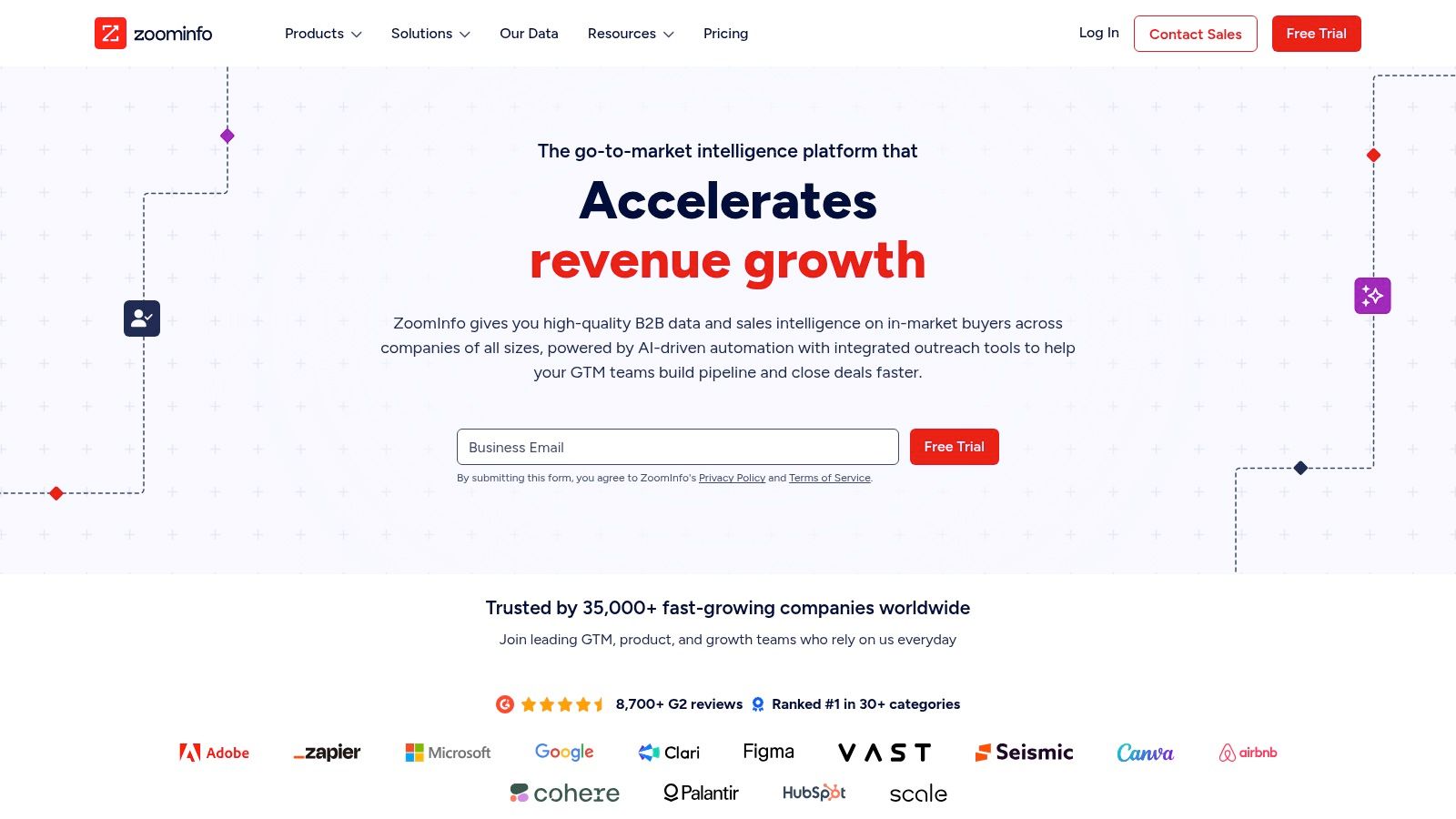
What makes ZoomInfo one of the best lead generation software choices for larger organizations is its depth of data and advanced filtering capabilities. Teams can build highly targeted lists based on criteria like company size, technology used, and recent funding events. The platform’s ability to enrich existing CRM data automatically also ensures that sales teams are always working with the most accurate and up-to-date information, directly within their workflow.
Key Features & Considerations
Best for: Enterprise B2B sales and marketing teams that require a high volume of accurate contact data and intent signals for strategic, large-scale prospecting.
-
Pros:
- Deep Data Coverage: Offers comprehensive data with extensive filtering, ideal for building precise target account lists.
- Intent Signals: Identifies companies showing purchase intent, allowing for more effective outreach timing.
- Broad Integrations: Seamlessly connects with major CRMs like Salesforce and HubSpot, enriching existing data automatically.
-
Cons:
- Expensive: Pricing is quote-based and represents a significant investment, making it less accessible for smaller businesses.
- Mixed User Feedback: Some users report challenges with cost-effectiveness and customer support responsiveness.
Website: ZoomInfo
5. LinkedIn Sales Navigator
LinkedIn Sales Navigator leverages the world’s largest professional network, transforming it into a powerful tool for social selling and targeted lead generation. Instead of cold outreach, it allows sales teams to find the right prospects with advanced search filters, gain key insights into accounts, and build relationships through personalized engagement. This platform is essential for B2B professionals who want to connect with decision-makers directly within their professional environment.
What makes Sales Navigator one of the best lead generation software options is its ability to provide real-time alerts on prospect activities, such as job changes or company news. This creates timely opportunities for warm outreach. By integrating these social selling tactics, you can significantly improve your response rates, making it a critical component of modern B2B lead generation strategies. For those looking to maximize their efforts, you can learn more about how to incorporate it into your workflow with these B2B lead generation strategies.
Key Features & Considerations
Best for: B2B sales teams and business development professionals focused on account-based marketing and building relationships with key decision-makers.
-
Pros:
- Unrivaled Network Access: Provides direct access to LinkedIn’s extensive database of professionals with advanced filtering.
- Warm Outreach: Real-time alerts and insights enable timely, relevant, and personalized communication.
- Transparent Pricing: Offers clear per-user pricing tiers (Core, Advanced, and Advanced Plus) for easy budgeting.
-
Cons:
- Requires Other Tools: Lacks direct email and phone data, often needing to be paired with other prospecting software.
- Limited Integrations: Key CRM integrations are primarily available in the higher-priced "Advanced" and "Advanced Plus" plans.
Website: LinkedIn Sales Navigator
6. Lusha
Lusha excels as a B2B data enrichment platform designed to provide sales and marketing teams with accurate contact information instantly. Its core strength lies in its ability to deliver direct phone numbers and verified email addresses for prospects directly from LinkedIn profiles or company websites. This functionality is powered by a seamless browser extension, making it an indispensable tool for reps who need to build targeted lead lists on the fly without leaving their workflow.
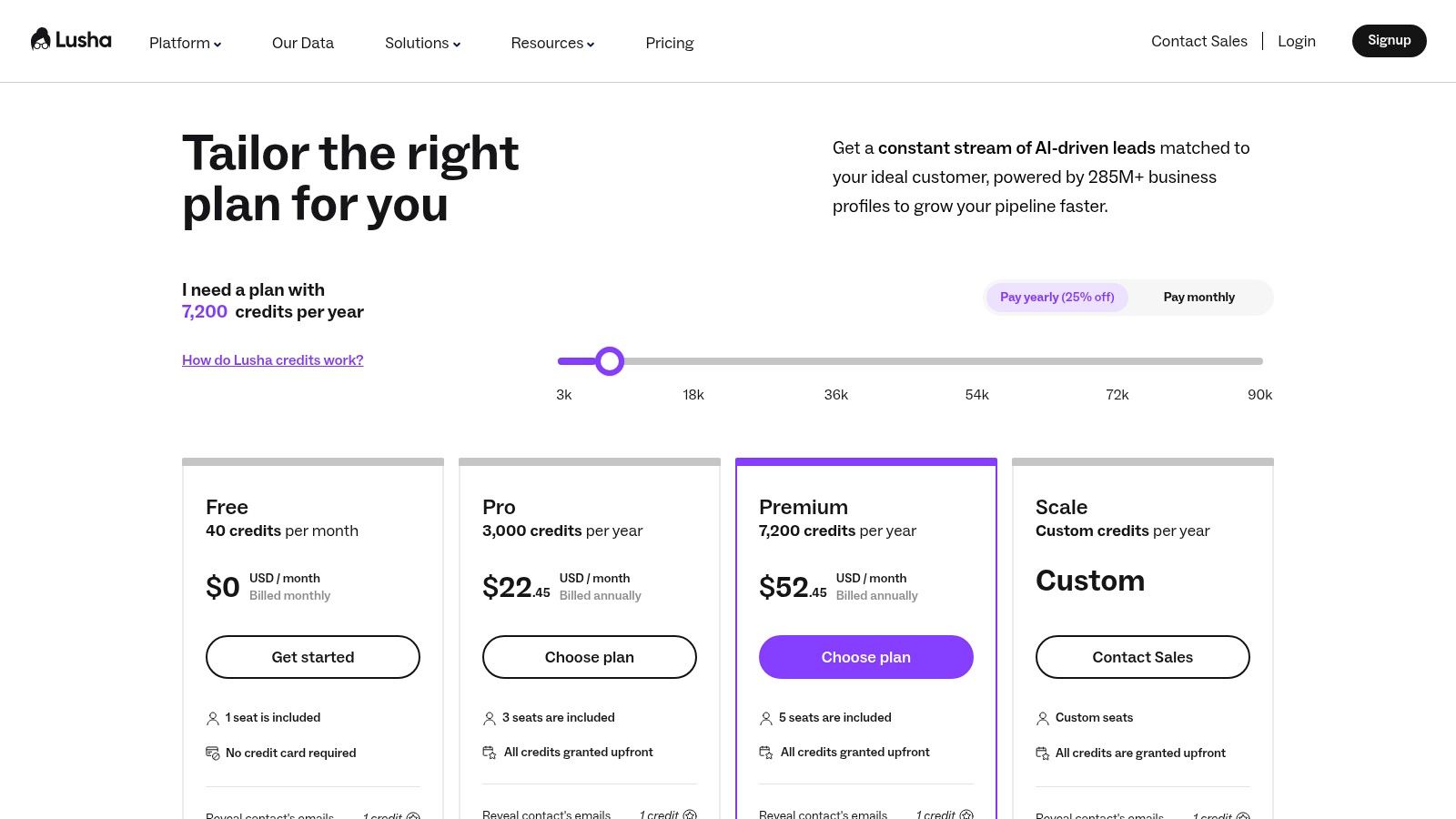
What solidifies Lusha's position as one of the best lead generation software options is its simplicity and speed. Instead of complex searches, users can enrich a single contact or build entire lists in moments, with data easily exported or synced to a CRM. The platform operates on a transparent credit system, where each revealed contact detail consumes a credit, giving teams clear visibility into their usage and budget. This model allows for quick adoption and immediate value.
Key Features & Considerations
Best for: Sales and business development teams needing fast access to direct-dial phone numbers and email addresses for targeted outreach.
-
Pros:
- Ease of Use: The Chrome extension provides a simple, one-click workflow for enriching leads directly from social profiles and websites.
- Generous Free Plan: Offers a free tier with monthly credits, allowing individuals and small teams to test its effectiveness without commitment.
- Transparent Credit System: Users know exactly how many credits are used for each action, making it easy to manage a budget.
-
Cons:
- High Credit Usage: Direct dial phone data can deplete credits quickly, requiring careful management for high-volume users.
- Plan-Restricted Features: Advanced functionalities like bulk enrichment and data exports are reserved for paid plans.
Website: Lusha
7. Hunter
Hunter is a specialized email discovery and verification tool designed for teams focused on building accurate outreach lists. Its core strength lies in its ability to find professional email addresses associated with a specific domain or individual, making it an essential asset for cold outreach and sales prospecting. The platform includes tools for finding, verifying, and managing contacts, along with a lightweight campaign feature to run simple cold email sequences.
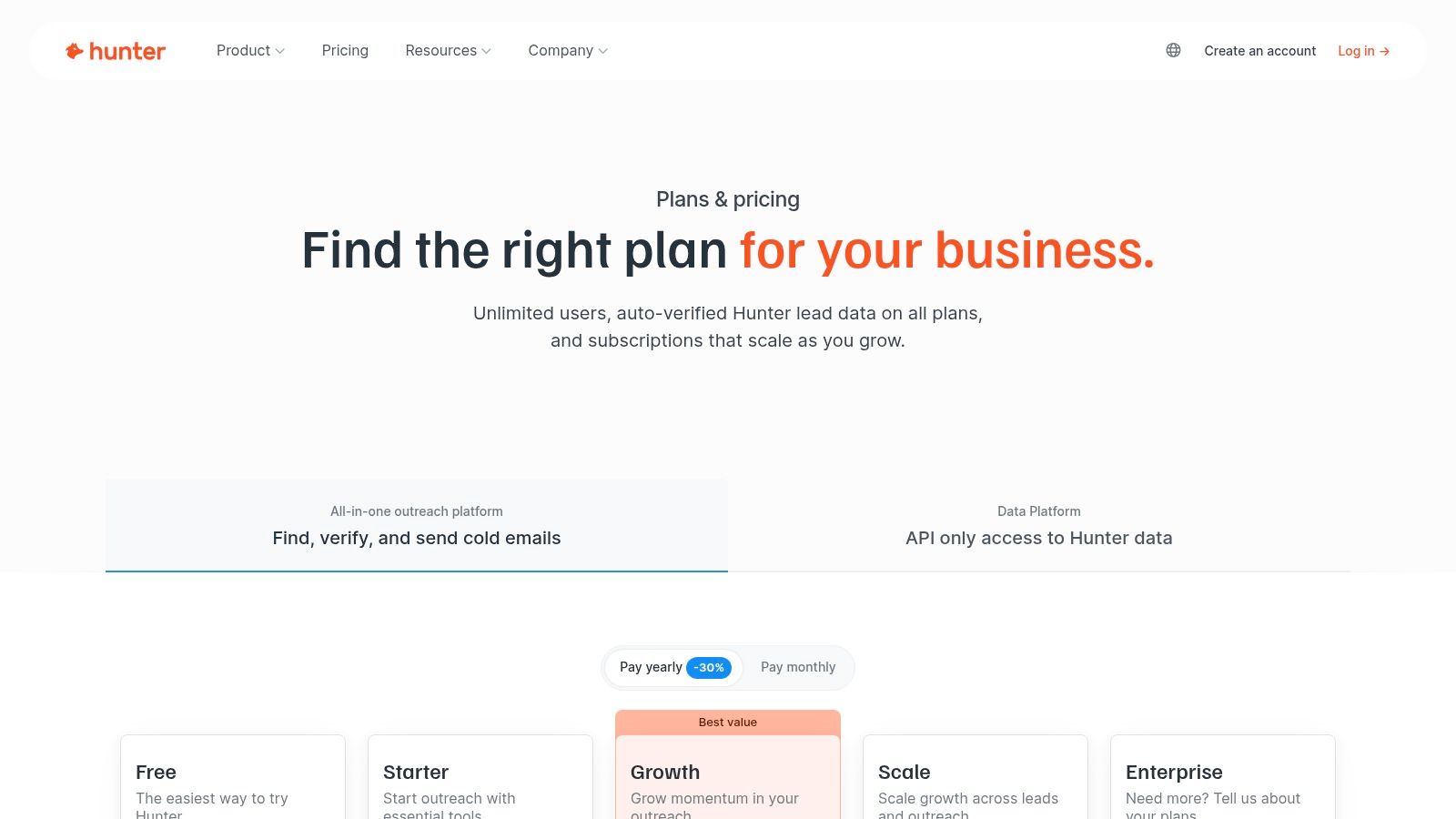
What makes Hunter a top-tier lead generation software is its straightforward, no-nonsense approach to email data. The platform provides a confidence score for each email found, helping users prioritize high-quality contacts and reduce bounce rates. Its Chrome extension and Google Sheets add-on streamline the process of collecting data directly from company websites or LinkedIn profiles, integrating seamlessly into existing workflows. For sales and business development teams, this tool simplifies the most time-consuming part of outreach: finding the right person to contact.
Key Features & Considerations
Best for: Sales teams and marketers who need a reliable, fast, and easy-to-use tool for finding and verifying professional email addresses for cold outreach.
-
Pros:
- Transparent Pricing: Offers a generous team user model, allowing multiple users to share a single plan and credit pool.
- Flexible Credits: Yearly plans front-load all credits, providing flexibility to use them as needed throughout the year.
- Strong Verification: Robust email verification features significantly improve campaign deliverability and sender reputation.
-
Cons:
- Email Focused: Lacks native phone number data, making it less ideal for multi-channel outreach strategies.
- Credit Management: Credit quotas require careful planning, especially during high-volume campaign periods.
Website: Hunter
8. OptinMonster
OptinMonster is a powerful on-site conversion and lead capture tool designed to turn your website visitors into subscribers and customers. It specializes in dynamic opt-in forms like popups, floating bars, and slide-ins, using intelligent targeting to engage users at the perfect moment. Its key differentiator is its extensive library of triggers, such as its signature exit-intent technology, which presents an offer just as a visitor is about to leave your site.
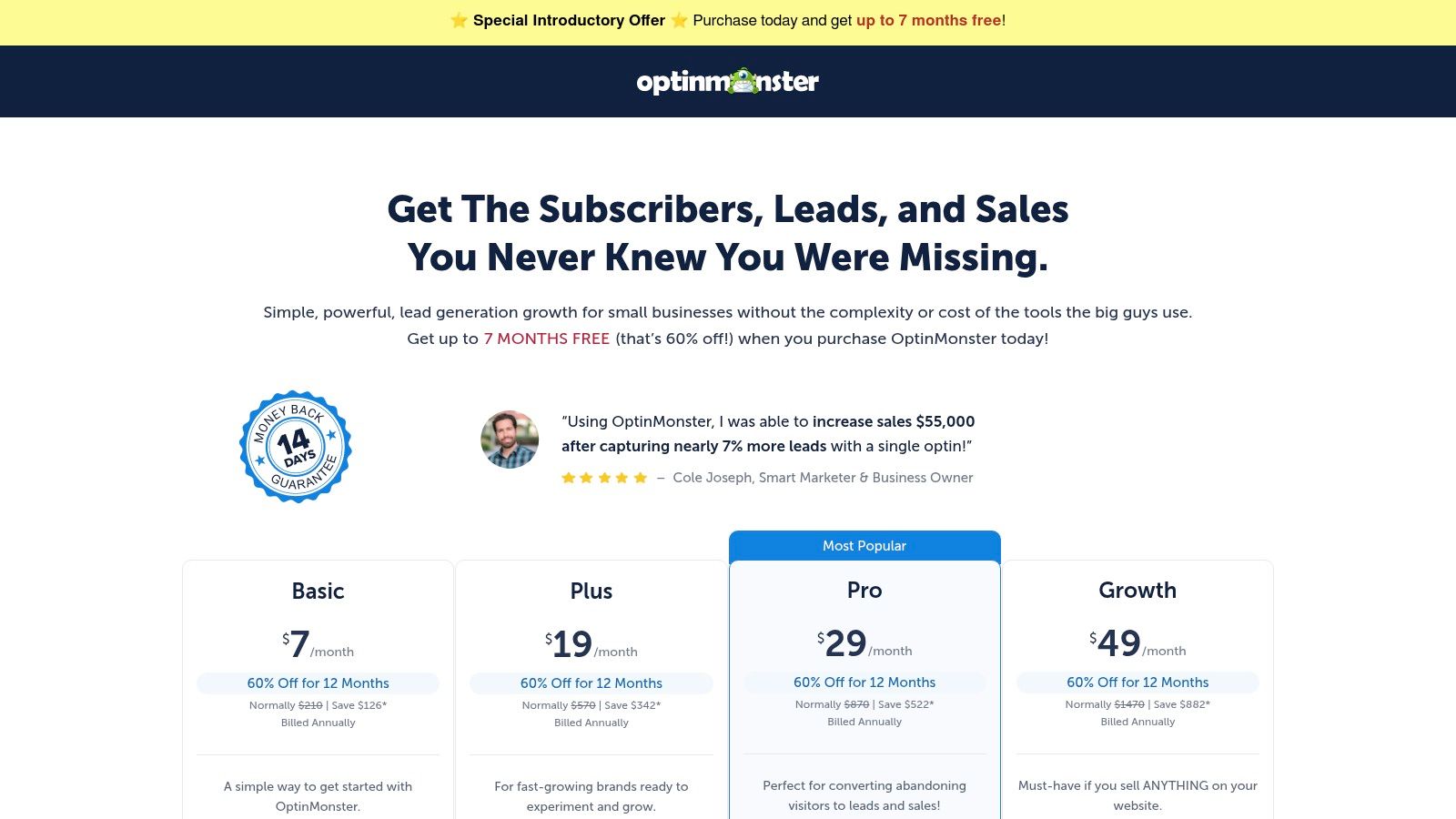
What makes OptinMonster one of the best lead generation software choices is its focus on behavior-based personalization. You can create unique campaigns based on referral source, geographic location, or even a user's previous interactions on your site. This level of customization ensures your messaging is always relevant, significantly boosting conversion rates. For a deeper dive into optimizing these touchpoints, explore these lead generation best practices.
Key Features & Considerations
Best for: Marketers and e-commerce businesses focused on maximizing on-site conversions and rapidly growing their email lists.
-
Pros:
- Powerful Targeting: Offers an extensive suite of targeting and trigger options, including exit-intent, geo-targeting, and on-site retargeting.
- Seamless Integrations: Connects easily with all major email marketing services, CRMs, and e-commerce platforms.
- Ease of Use: Features a drag-and-drop builder and a vast template library, making it simple to launch professional campaigns quickly.
-
Cons:
- Pricing Structure: Annual billing is heavily incentivized, making the monthly payment options significantly more expensive.
- Impression Limits: Plans come with pageview caps, which may require an upgrade for high-traffic websites.
Website: OptinMonster
9. Unbounce
Unbounce is a specialized platform focused on creating high-converting landing pages, popups, and sticky bars. Unlike all-in-one marketing suites, its core strength lies in enabling marketers to quickly build and launch campaign-specific pages without needing a developer. This makes it ideal for running targeted paid advertising, social media, or email campaigns where a dedicated, distraction-free user journey is crucial for capturing leads.
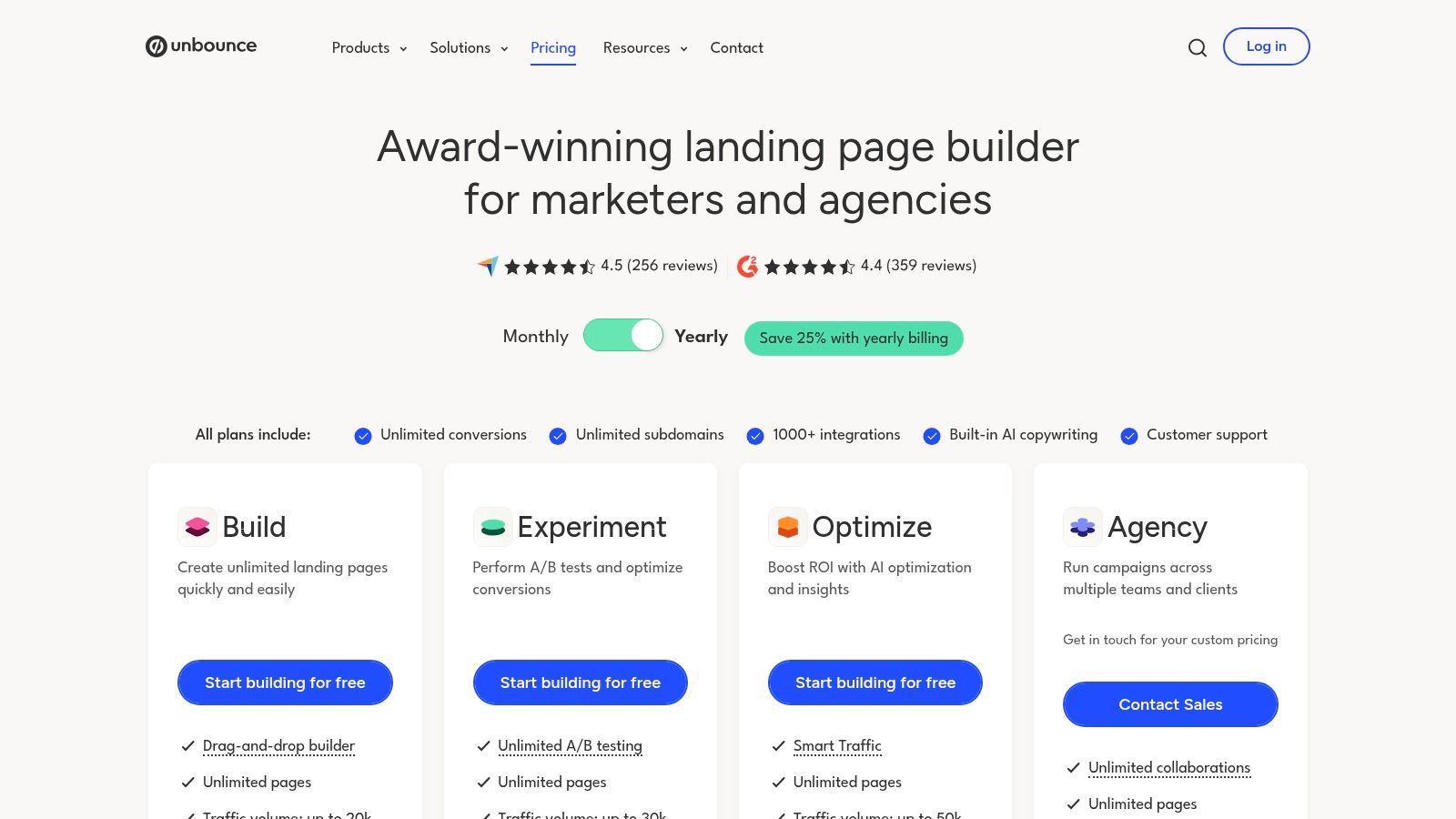
What makes Unbounce one of the best lead generation software tools is its powerful optimization suite. Features like AI-powered Smart Traffic and built-in A/B testing allow you to automatically direct visitors to the page variant most likely to convert for them. With AI copywriting assistance and advanced targeting triggers, you can refine your messaging and offers to maximize return on ad spend, turning more clicks into qualified leads. This focus on conversion rate optimization is its key differentiator.
Key Features & Considerations
Best for: Marketers and agencies who need to rapidly deploy and test dedicated landing pages for paid search and social media campaigns.
-
Pros:
- Fast Page Creation: The drag-and-drop builder allows for quick creation of custom pages suited for specific campaigns.
- Built-in Optimization: Conversion-focused tools like A/B testing and AI insights are integrated to help improve campaign ROI.
- All-Inclusive Hosting: Page hosting is included, and a free 14-day trial is available to test the platform.
-
Cons:
- Strict Visitor Caps: Plans come with visitor and conversion limits, and you are automatically upgraded to a higher tier if you exceed them.
- Requires Testing: Achieving strong results depends on continuous design, copy, and offer testing over time.
Website: Unbounce
10. Dealfront (Leadfeeder) – Web Visitors Identification
Dealfront (formerly Leadfeeder) transforms anonymous website traffic into actionable B2B leads by identifying the companies that visit your site. Instead of waiting for a prospect to fill out a form, this tool de-anonymizes your visitors, showing you which businesses are already researching your solutions. This provides a proactive way for sales teams to engage with high-intent accounts that have shown direct interest.
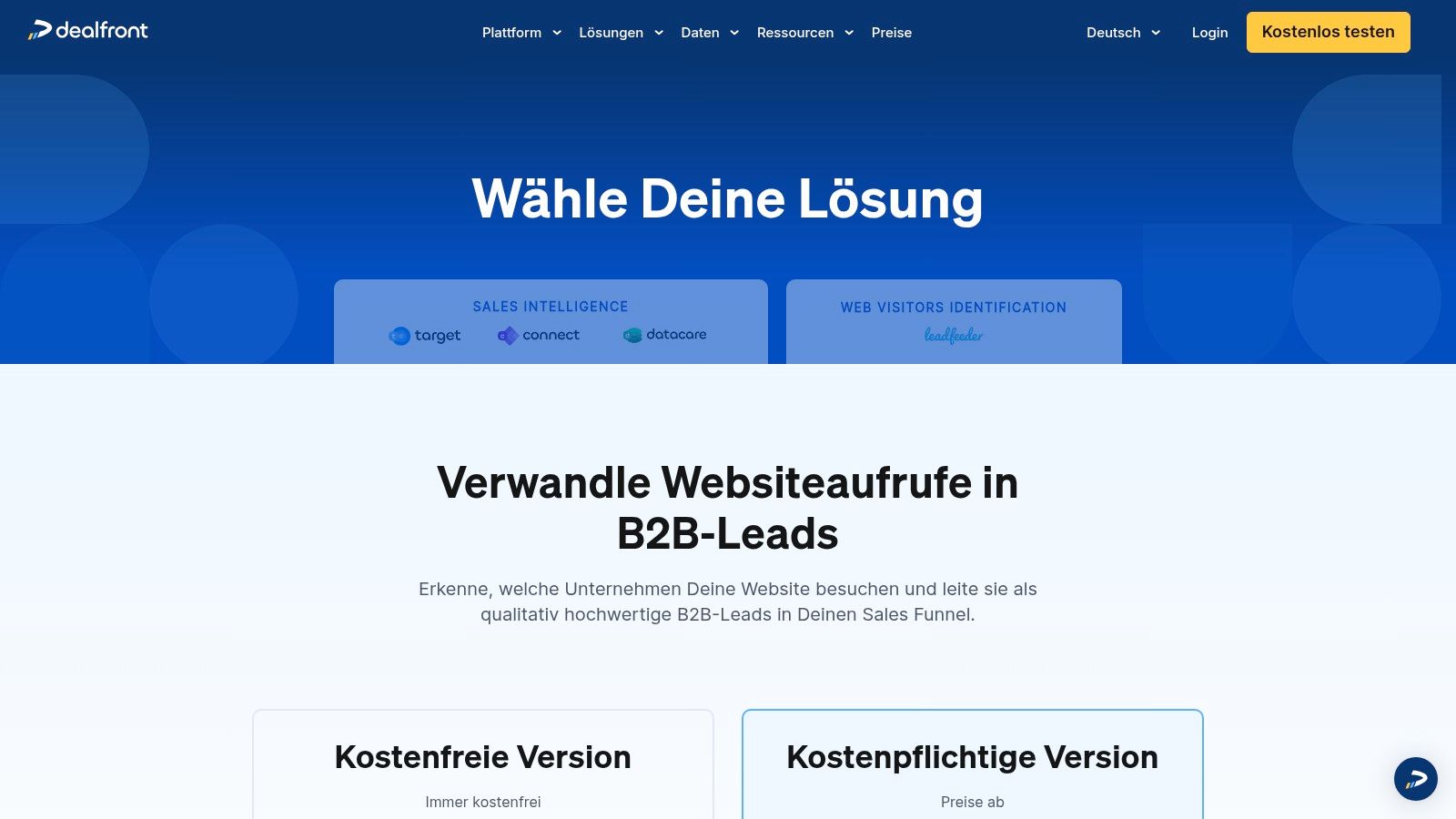
What makes Dealfront a top contender for the best lead generation software is its focus on intent-driven outreach. By integrating with your CRM and sending alerts via Slack, it enables your team to act on new visitor data in near real-time. This is particularly powerful for account-based marketing (ABM) strategies, as you can tailor follow-ups based on the specific pages a target account viewed, making your outreach far more relevant and timely.
Key Features & Considerations
Best for: B2B companies looking to capitalize on anonymous website traffic and identify high-intent leads for proactive sales and marketing outreach.
-
Pros:
- Proactive Lead Source: Uncovers otherwise hidden leads who are already exploring your website, perfect for ABM.
- Actionable Alerts: Integrations with CRM and Slack provide immediate notifications for sales teams to follow up on.
- Scalable Pricing: The model is based on the number of unique companies identified, making it adaptable to different traffic levels.
-
Cons:
- Limited Free Plan: The free version is capped at 100 identified companies and only retains data for the last 7 days.
- Variable Pricing: Costs can differ based on your region and currency, which may require a custom quote.
Website: Dealfront (Leadfeeder) – Web Visitors Identification
11. Salesforce AppExchange – Sales/Lead Apps
For businesses already operating within the Salesforce ecosystem, the Salesforce AppExchange is less a single tool and more of a curated superstore for enhancing your existing setup. Instead of offering one specific function, it provides a secure marketplace filled with thousands of third-party applications designed to plug directly into your Salesforce instance. This allows teams to find and deploy specialized lead generation tools for routing, enrichment, and data capture with guaranteed compatibility.
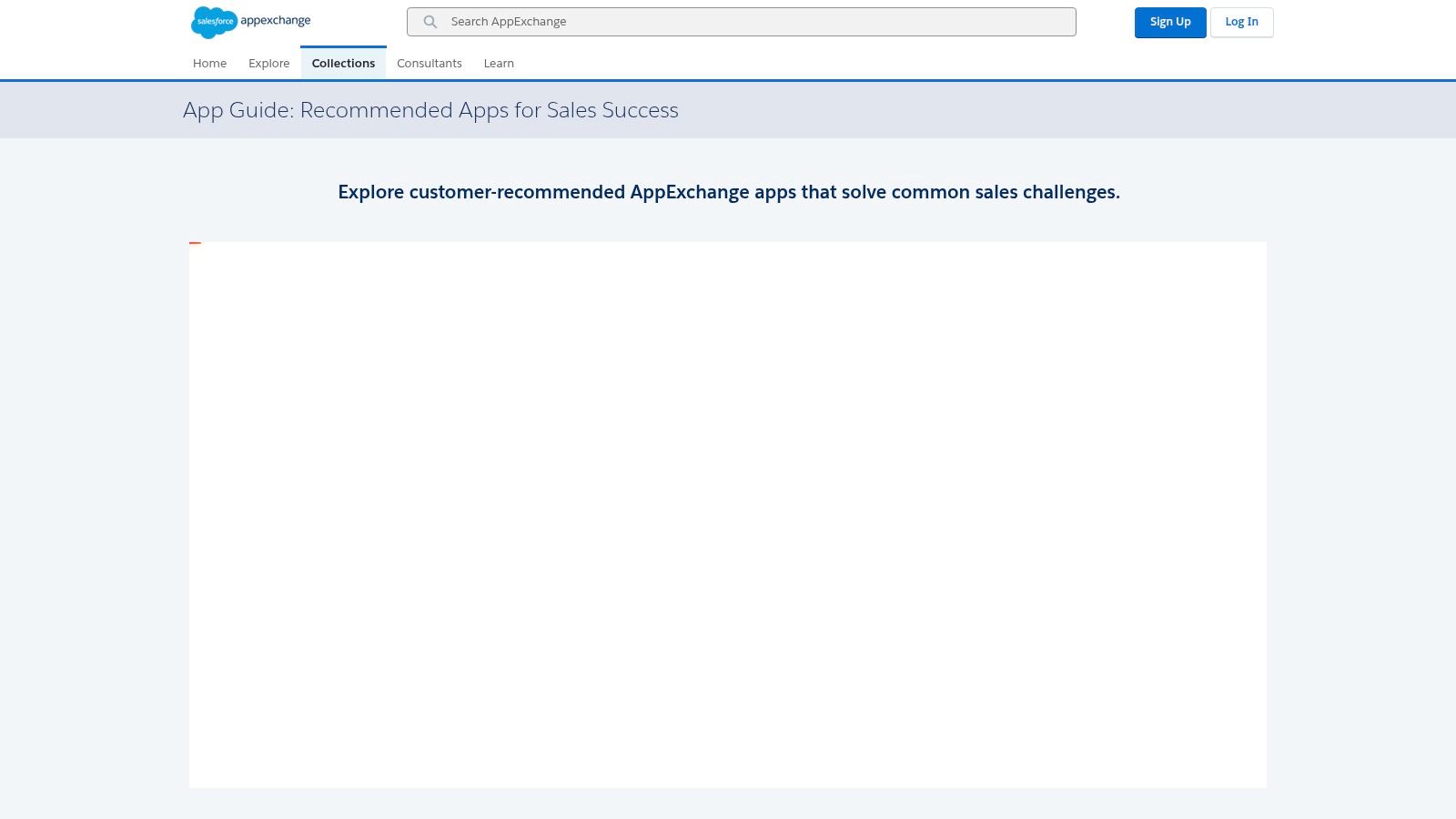
What makes the AppExchange one of the best lead generation software resources is its focus on extending, not replacing, your core system. You can browse vetted solutions with transparent user reviews, pricing, and free trials, ensuring you add functionality without compromising data security or creating integration headaches. For those looking to maximize their investment in customer relationship management, understanding this marketplace is crucial. You can get a primer on this with our guide to customer relationship management basics.
Key Features & Considerations
Best for: Companies already using Salesforce who need to add specialized lead generation capabilities like advanced routing, data enrichment, or territory management.
-
Pros:
- Safe Integration: All apps are vetted by Salesforce, ensuring a secure extension of your existing environment.
- Wide Variety: Offers an extensive selection of apps covering niche lead generation needs, from data cleansing to appointment scheduling.
- Transparent Information: Listings provide clear compatibility details, edition requirements, and user reviews to inform decisions.
-
Cons:
- Salesforce-Dependent: The value is almost exclusively for organizations that have already adopted Salesforce as their CRM.
- Variable Cost: Pricing and licensing models differ significantly between applications, requiring individual evaluation for each tool.
Website: Salesforce AppExchange – Sales/Lead Apps
12. G2 – Lead Generation Software Category
While not a lead generation tool itself, G2’s dedicated category is an essential starting point for any team evaluating their software options. It functions as a meta-resource, aggregating user reviews, feature comparisons, and market trends to help you navigate the crowded landscape. Instead of relying on vendor marketing copy, G2 provides a real-world perspective from verified users, making it easier to build an informed shortlist of potential solutions.
This platform allows you to filter the best lead generation software by specific criteria like company size, user satisfaction, and feature sets. You can directly compare top contenders using its proprietary Grid reports, which visualize market leaders and niche players based on user ratings and market presence. For teams conducting due diligence, this is an invaluable resource for discovering alternatives and understanding the pros and cons of each tool before committing to a demo or purchase.
Key Features & Considerations
Best for: Businesses of all sizes looking to research, compare, and shortlist lead generation software based on verified user reviews and data-driven market reports.
-
Pros:
- Verified User Reviews: Provides honest feedback on features, usability, and support from people who actively use the software.
- Comprehensive Comparisons: Grid reports and detailed filters help you quickly identify top-rated tools and direct competitors.
- Market Transparency: Offers an unbiased view of the market, highlighting both established leaders and emerging innovators.
-
Cons:
- Influenced Placement: Sponsored placements and vendor promotions can sometimes affect a product's visibility on the platform.
- Inconsistent Pricing Data: Pricing information is often user-reported or approximate, requiring direct verification with the vendor.
Website: G2 – Lead Generation Software Category
Top 12 Lead Generation Software Comparison
| Solution | Core Features | User Experience & Quality | Value Proposition | Target Audience | Price Points & Plans |
|---|---|---|---|---|---|
| B2B Email Verifier | 99%+ accurate email validation; bulk uploads | Secure with end-to-end encryption; intuitive UI | Reduces bounces & spam; flexible tiers with collaboration | Marketers, sales teams, data managers | Customizable tiers; contact sales for pricing |
| HubSpot Marketing Hub | CRM + marketing automation; forms, CTAs | Mature ecosystem; easy tool consolidation | All-in-one marketing suite; clear upgrade paths | SMB to enterprise marketers | Free tier; scalable upgrades; onboarding fees |
| Apollo.io | Contacts database; sales sequences; API | Flexible credits system; trial plans | Data + engagement tools; strong SMB value | SMB & mid-market sales teams | Credits-based; free & trial options |
| ZoomInfo SalesOS | Extensive B2B data; intent & enrichment | Enterprise-grade features; broad ecosystem | Deep data coverage for complex sales | Large enterprises & complex sales teams | Quote-based; generally expensive |
| LinkedIn Sales Navigator | Advanced LinkedIn search & messaging | Transparent per-seat pricing; network access | Social selling & warm outreach | Sales & account teams using LinkedIn | Per-seat plans; some premium integr. limits |
| Lusha | Email & phone leads; browser extension | Fast setup; transparent credit use | Quick lead enrichment from web & LinkedIn | Sales reps & lead enrichment users | Credit-based; free plan with limits |
| Hunter | Email finder & verification; campaign mgmt | Generous team credits; transparent pricing | Strong email verification & campaign tools | Small to mid marketing teams | Monthly/yearly plans; credit quotas |
| OptinMonster | Onsite lead capture with popups & targeting | Extensive targeting; impression pricing | Boosts conversions with varied templates | Marketers focused on web conversions | Annual billing emphasized; tiered by impressions |
| Unbounce | Landing page builder with A/B testing | Fast page creation; testing tools | Improves campaign ROI with AI & insights | Digital marketers & advertisers | Visitor caps; free trial; plan tiers |
| Dealfront (Leadfeeder) – Web Visitors ID | Website visitor company ID; CRM sync | Near real-time updates; clear free/paid | Account-based marketing & sales alerts | B2B marketers & sales ops | Free limited plan; scalable paid plans |
| Salesforce AppExchange – Sales/Lead Apps | Curated lead-gen apps for Salesforce | Safe, vetted apps; wide variety | Extend Salesforce with lead-gen tools | Salesforce users | Varies widely by app & licensing |
| G2 – Lead Generation Software Category | Software review & comparison platform | Updated rankings; verified reviews | Research & shortlist building | Buyers & decision-makers in software | Free access; pricing user-reported |
Choosing the Right Tool for Sustainable Growth
Navigating the crowded market for the best lead generation software can feel overwhelming. We've explored a wide range of powerful platforms, from all-in-one CRMs like HubSpot and comprehensive data powerhouses like ZoomInfo and Apollo.io, to specialized tools for conversion like OptinMonster and Unbounce. Each solution offers a unique approach to filling your sales pipeline, but the most important takeaway is that there is no single "best" tool for everyone.
The right choice depends entirely on your specific business context. A startup focused on outbound sales might find the perfect combination of data and engagement features in Apollo.io, while a marketing agency will appreciate the conversion optimization capabilities of Unbounce. Similarly, an established enterprise team might rely on the robust, integrated ecosystem of LinkedIn Sales Navigator and Salesforce. The key is to move beyond feature lists and align your choice with your strategic goals.
How to Select Your Lead Generation Software
Making a final decision requires a clear-eyed assessment of your company's needs. Before you commit to a subscription, walk through these critical steps to ensure you're making a strategic investment rather than just buying another tool.
-
Define Your Primary Goal: Are you trying to improve outbound prospecting, capture more inbound leads from your website, or identify anonymous website visitors? Your primary objective will immediately narrow the field. For instance, if converting existing web traffic is your top priority, start by evaluating OptinMonster. If building targeted outbound lists is the goal, look closer at Lusha or Hunter.
-
Assess Your Current Tech Stack: The best lead generation software should complement, not complicate, your existing workflows. Consider how a new tool will integrate with your CRM, email marketing platform, and other essential systems. Platforms like HubSpot offer the advantage of a unified system, while tools found on the Salesforce AppExchange are designed for seamless integration.
-
Evaluate Your Budget and Scalability: Your budget is a major factor, but think beyond the monthly price tag. Consider the long-term value and the tool's ability to grow with your business. Some platforms offer flexible, usage-based pricing that can be ideal for smaller teams, while others require a significant upfront investment better suited for larger organizations.
The Foundation of All Lead Generation: Data Quality
Regardless of which software you choose to find and engage prospects, the success of your efforts hinges on one non-negotiable factor: the quality of your contact data. A powerful platform like Apollo.io or ZoomInfo is only as good as the accuracy of the emails and phone numbers it provides. Sending campaigns to invalid email addresses wastes resources, damages your sender reputation, and can get your domain blacklisted by email providers.
This is why integrating a dedicated email verification tool is not just a recommendation; it's a fundamental requirement for sustainable growth. A service like B2B Email Verifier acts as the ultimate quality control gatekeeper for your entire lead generation engine. By verifying contact information before it enters your CRM or your outreach campaigns, you ensure every other tool in your stack operates at peak efficiency. This simple step protects your investment, maximizes deliverability, and ensures your sales team spends its time talking to real, interested prospects.
Ultimately, building a powerful lead generation strategy is about creating a symbiotic system. You combine a tool that excels at lead acquisition with a process that guarantees lead quality. By carefully selecting the best lead generation software for your unique needs and underpinning it with a rock-solid verification process, you create a reliable, efficient, and powerful engine that will drive predictable revenue and long-term success.

